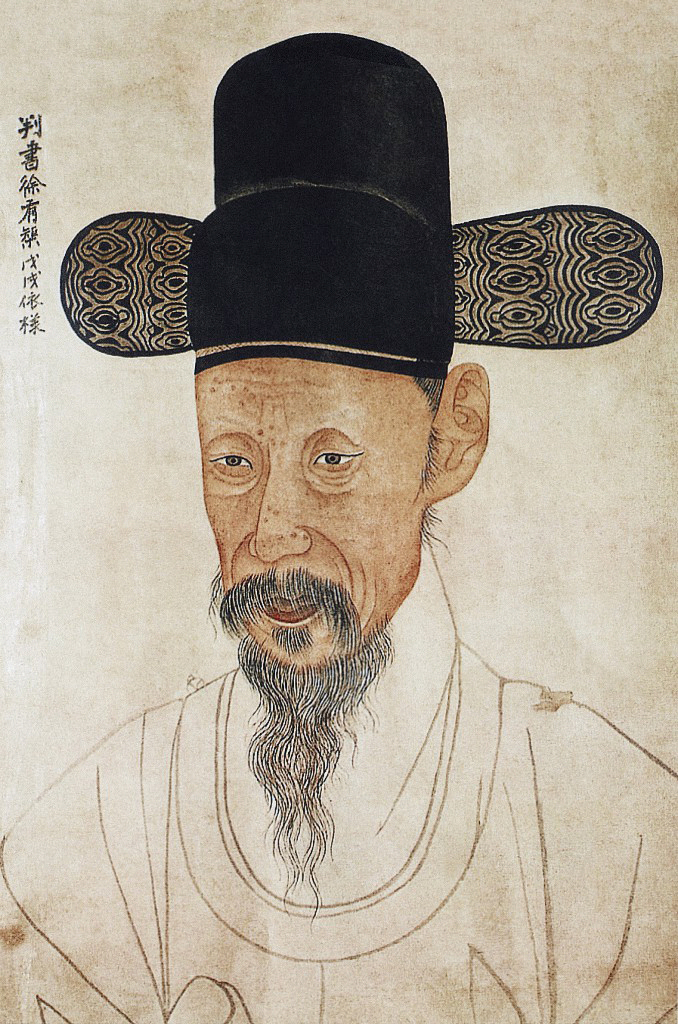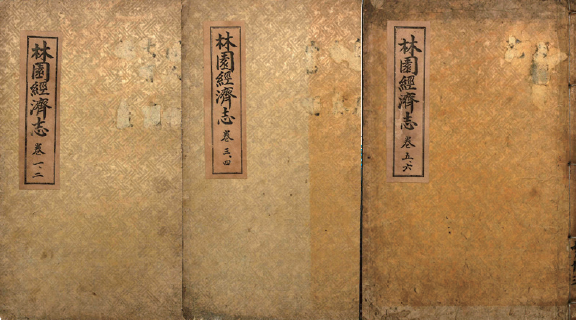동북아역사재단 2021년 03월호 뉴스레터
- Park Jang-bae, Director of the Institute on Eurasian History at NAHF
Covid-19 Pandemic makes people feel that what they have enjoyed in everyday life is no longer natural. It is difficult to find a person who is only Seo Yu-gu(1764~1845) as a person who reminds us of the importance of common and everyday things that we can easily overlook. Seo Yu-gu said, "The most important thing in the world is grain, and what you need to know is farming." The farming he said does not mean only agriculture, but it encompasses all economic activities. People did not look back on his accomplishments, but in fact he was a vein of culture.

A practical encyclopedia covering all knowledge
Recently, some of the society began to reexamine Seo Yu-gu's 『Imwongyongjeji』. According to Jin Byung-chun's 『Poongseok Seo yu-gu』(2014), young and vigorous scholars organized ‘the Imwon Economic Research Institute’ in 2003 and are working on the translation of 『Imwongyongjeji』 and are publishing that sequentially. This is a total of 113 volumes, a vast amount of encyclopedias written in 16 fields, 28,000 subjects, and 2.52 million letters. It is also called 『Imwonsibyookji』 because it is divided into 16 fields. This book is about farming, covering all the knowledge needed for everyday life. The reader of this book was not limited to nobleman. The ordinary people who live in daily life and work in the business read this book.
Seo Yu-gu began compiling the 『Imwongyongjeji』 in 1813(Sunjo 13). The book was compiled over 30 years, and completed in 1842(Heonjong 8). This was three years before Seo Yu-gu's death. A total of 893 books were cited in the 『Imwongyongjeji』. There are 100 domestic books and 800 Chinese books. The number of books is remarkably different, but the proportions cited are almost similar.
The 『Imwongyongjeji』 is composed like this. ①bonliji : Grain farming(4 Themes, 2 Books), ②gwanhyuji : vegetable and herb farming(5 Themes, 2 Books), ③yewonji : flower farming(5 Themes, 2 Books), ④manhagji : fruit tree farming(5 Themes, 2 Books), ⑤jeongongji : Gilsam(5 Themes, 2 Books), ⑥wiseonji : weather and astronomical data(4 Books), ⑦jeon-eoji : livestock, fish, beekeeping, hunting, and language(4 Themes, 2 Books), ⑧jeongjoji : Food, Cooking(7 Themes, 4 Books), ⑨seom-yongji : Architecture, Tools, Daily Products(4 Themes, 2 Books), ⑩boyangji : Health, Curing(8 Books), ⑪injeji : Medicine(28 Themes, 11 Books), ⑫hyanglyeji : Rituals(5 Themes, 2 Books), ⑬yuyeji : Cultural Education(6 Themes, 3 Books), ⑭iunji : Culture, Arts(8 Themes, 4 Books), ⑮sangtaegji : Feng Shui/Geomancy(2 Themes, 1 Book), ⑯yegyuji : Commerce(5 Themes, 2 Books)

『Imwongyongjeji』
(collection : Forest Science Museum of Gyeongsangbuk-Do)
Seo Yu-gu's Life
Seo Ho-su and Lee were the parents of Seo Yu-gu, who gave birth to him in November 1764(Yeongjo 40). And Seo Yu-gu died in November 1845, in eighty two. His life is divided into 16 years of primary office life from 1790(Jeongjo 14), 17 years from 1806(Sunjo 6), and 16 years of secondary office life from 1823(Seonjo 23).
His family belonged to ‘Soron’, but the party color was not so strong, and he played in the government with the special trust of Jeongjo. His grandfather, Seo Myeong-eung, was an aide to Jeongjo in the field of study, and his grandfather, Seo Myeong-seon, was the right-hand man of Jeongjo in the field of politics. They had academic orientations centered on people's livelihoods, such as natural sciences, agriculture, and practical studies. Agriculture was the study of their entire family. Among them, Seo yu-gu was the only person who experienced farming in the agricultural field, and he exceeded the limit of 'study of family' based on his experience.
After completing his first official life, Seo yu-gu began to organize the science of architecture and compile agricultural books to help the people's lives. And he finished and succeeded the 『Haedong Farming Book』 left by his father who suddenly died. At that time, the Joseon Dynasty was in desperate need of agricultural books. The first official agricultural book of Joseon was 『Nongsa Jikseol』 compiled in 1429 under the direction of Sejong.
There are also Kang Hee-Maeng's 『Geumyangjabrok』 in 1492, Heo Gyun's 『Hanjeongrok』 in 1618 after the Japanese invasion of Korea, Park Se-dang's 『Saekgyeong』 in 1676, Hong Man-seon's 『Sanlimgyeongje』 about 1700, Yu Joong-rim's 『Jeungbo Sanlimgyeongje』, Seo Myeong-eung's 『Kosashinseo』 in 1771 and 『Bonsa』 in 1787. One of the reasons why Seo Yu-gu compiled the 『Imwongyongjeji』 was to supplement the limitations of 『Sanlimgyeongje』(4 themes, 4 books, 16 papers). At this time, Bingheogak Lee, Seo Yu-gu’s elder brother's wife, was also compiling the 『Gyuhabchongseo』, an encyclopedia related to what women should do at home. This book also seems to have interacted with the 『Imwongyongjeji』.
Seo Yu-gu compiled 『Imwongyongjeji』 with his son Seo Woo-bo in Jangdan, Paju. In March 1837, he lived with his family in Beongye, made a calendar for farming, and made it a song called ‘Jeongawollyeongga’
Write an encyclopedia of food and cooking in the 『Imwongyongjeji』
The special thing that is noticed in 『Imwongyongjeji』 is 『Jeongjoji』. Kwak Mi-kyung mixed the food recipe and life of Seo Yu-gu through 『Chef of Joseon, Seo Yu-gu』 (2016). The Food Research Institute of Pungseok Cultural Foundation restored and explained the kimchi dish of Seoyugu through 『Joseon Chef Seo yu-gu, His Story about Kimchi』(2018). Detsu Okada, who wrote 『The Birth of Doncas』 said that it was Doncas that the food culture of Japan and the West was well combined for 60 years. Kimchi has also developed into its current state through a long process of civilized exchanges. In 2013, "Kimjang, making and sharing kimchi" was listed as a UNESCO Masterpieces of the Oral and Intangible Heritage of Humanity. The reason for selecting this as Heritage of Humanity is to share the originality and unique value of kimchi with the world.
Seo Yu-gu's mother was so good at food that she discussed alcohol and food with family relatives. He recalled his mother in 『Geumhwabijijib』. “My mother was very good at cooking, the water plant by the stream, the begetable in the fields, all of which became different and delicious when she touched.” In this passage, we can imagine his mother's 'magic touch'. Biologist Dr. Rob Dunn said in Never Home Alone(2020): “Maybe the taste of kimchi is not only a microbial magic touch, but also a word that is not in Korea ‘taste of the house’.”
In his family was Lee, wife of Seo Hae(1537–1559). Lee moved to Hanyang after his husband died. And she made precious yakgwa(honey cookie), yakbap(sweet rice with nuts and jujubes), and cheogju(refined rice wine) and sold that on the street. And with the money, she raised her son Seo Sung(1558–1631) and fed her family. It is unknown whether such food skills have even passed down to Seo Yu-gu. However, he had an extraordinary knowledge of food. Seo Yu-gu showed through the 『Imwongyongjeji』 that was a constantly changing agricultural culture and food culture. He devoted 30 years to organizing.
동북아역사재단이 창작한 '일상의 소중함을 보여준 실학자 서유구와 『임원경제지』 ' 저작물은 "공공누리" 출처표시-상업적이용금지-변경금지 조건에 따라 이용 할 수 있습니다.



